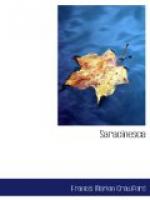“I would certainly advise you to think no more about it, if you are sure that you cannot be happy with her.”
Giovanni drew a long breath, the blood returned to his face, and his hands unlocked themselves.
“I will think no more about it,” he said. “Heaven bless you for your advice, Duchessa!”
“Heaven grant I have advised you well!” said Corona, almost inaudibly. “How cold this house is! Will you put down my cup of tea? Let us go near the fire; Strillone is going to sing again.”
“I would like him to sing a ‘Nune dimittis, Domine,’ for me,” murmured Giovanni, whose eyes were filled with a strange light.
Half an hour later Corona d’Astrardente went down the steps of the Embassy wrapped in her furs and preceded by her footman. As she reached the bottom Giovanni Saracinesca came swiftly down and joined her as her carriage drove up out of the dark courtyard. The footman opened the door, but Giovanni put out his hand to help Corona to mount the step. She laid her small gloved fingers upon the sleeve of his overcoat, and as she sprang lightly in she thought his arm trembled.
“Good night, Duchessa; I am very grateful to you,” he said.
“Good night; why should you be grateful?” she asked, almost sadly.
Giovanni did not answer, but stood hat in hand as the great carriage rolled out under the arch. Then he buttoned his greatcoat, and went out alone into the dark and muddy streets. The rain had ceased, but everything was wet, and the broad pavements gleamed under the uncertain light of the flickering gas-lamps.
CHAPTER III.
The palace of the Saracinesca is in an ancient quarter of Rome, far removed from the broad white streets of mushroom dwelling-houses and machine-laid macadam; far from the foreigners’ region, the varnish of the fashionable shops, the whirl of brilliant equipages, and the scream of the newsvendor. The vast irregular buildings are built around three courtyards, and face on all sides upon narrow streets. The first sixteen feet, up to the heavily ironed windows of the lower storey, consist of great blocks of stone, worn at the corners and scored along their length by the battering of ages, by the heavy carts that from time immemorial have found the way too narrow and have ground their iron axles against the massive masonry. Of the three enormous arched gates that give access to the interior from different sides, one is closed by an iron grating, another by huge doors studded with iron bolts, and the third alone is usually open as an entrance. A tall old porter used to stand there in a long livery-coat and a cocked-hat; on holidays he appeared in the traditional garb of the Parisian “Suisse,” magnificent in silk stockings and a heavily laced coat of dark green, leaning upon his tall mace—a constant object of wonder to the small boys of the quarter. He trimmed his white beard in imitation of his master’s—broad and square—and his words were few and to the point.




